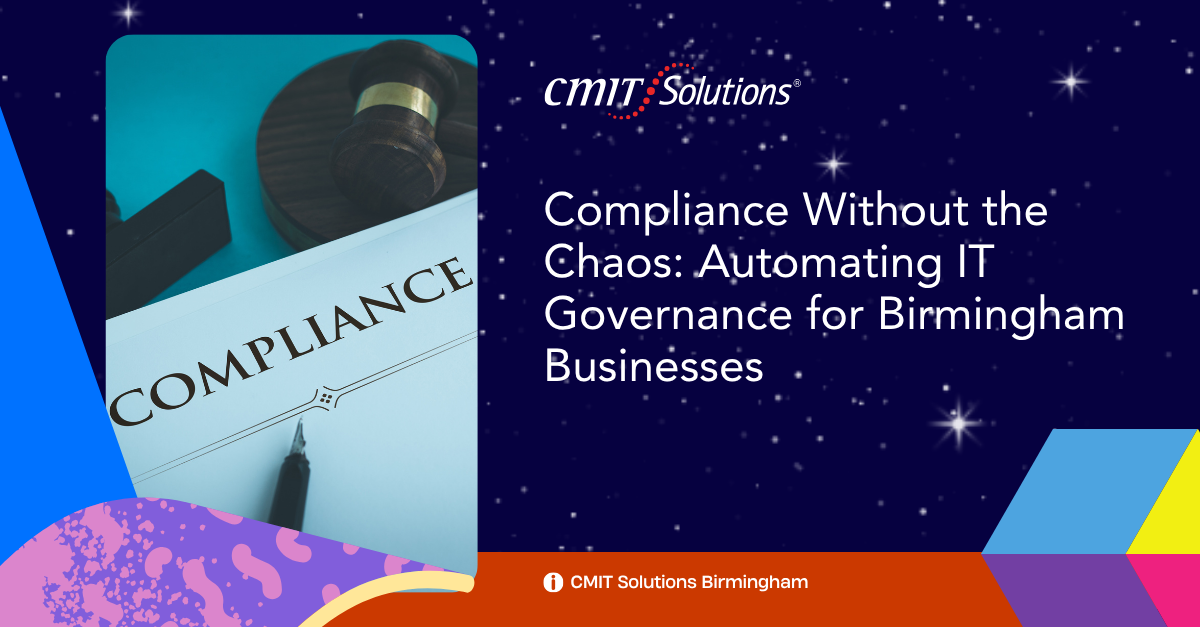In today’s fast-moving business landscape, companies in Birmingham face constant pressure to meet evolving regulatory standards while safeguarding sensitive information and maintaining daily operations. But compliance, when mismanaged, becomes an overwhelming and expensive endeavor. Enter automated IT governance—your business’s secret weapon to meet regulatory demands without compromising productivity, profitability, or peace of mind.
This blog will explore how businesses in Birmingham can embrace automation to streamline compliance, reduce risk, and achieve long-term operational excellence. Whether you’re a small business owner or a CIO at a mid-sized firm, this comprehensive guide is tailored to empower your compliance journey.
The Regulatory Storm Facing Birmingham Businesses
As digital threats grow more sophisticated, so do the regulations aiming to mitigate them. In Birmingham, companies across industries—finance, healthcare, manufacturing, legal, and retail—must navigate a range of compliance frameworks, including:
- HIPAA (Health Insurance Portability and Accountability Act)
- PCI-DSS (Payment Card Industry Data Security Standard)
- CMMC (Cybersecurity Maturity Model Certification)
- SOX (Sarbanes-Oxley Act)
- GDPR (General Data Protection Regulation)
- NIST Cybersecurity Framework
Each regulation demands unique reporting structures, risk assessments, access controls, and security controls. Trying to manage these manually with spreadsheets or outdated tools isn’t just inefficient—it’s a liability. Automating IT governance transforms these tasks into manageable, repeatable processes that reduce human error and boost your security posture.
Explore compliance-ready IT solutions in Birmingham tailored to meet your industry-specific requirements.
What Is Automated IT Governance?
Automated IT governance refers to the integration of technology, workflows, and controls to monitor, enforce, and demonstrate adherence to internal policies and external regulations—without the need for constant manual intervention.
With automated tools, businesses can:
- Track and audit data access
- Maintain real-time visibility into vulnerabilities
- Ensure version control and policy enforcement
- Produce audit-ready reports instantly
- Schedule recurring risk assessments
This shift not only ensures compliance but enhances your overall cybersecurity strategy by promoting consistency, accountability, and proactive risk mitigation.
Why Compliance Automation Matters for Birmingham SMEs
Small and medium-sized businesses (SMBs) in Birmingham often lack the in-house resources to manage complex compliance frameworks. Yet, they are increasingly targeted by cybercriminals who view them as easier entry points.
Automating IT governance helps Birmingham businesses:
- Prevent fines and penalties by staying ahead of audits
- Reduce overhead by eliminating time-consuming manual processes
- Boost client trust through secure data handling
- Enhance incident response with real-time monitoring and alerts
If your organization handles protected health information (PHI), cardholder data, or intellectual property, automation is no longer a luxury—it’s a necessity. Learn more about automated IT compliance tools for healthcare and finance companies.
Key Components of Effective Compliance Automation
To fully automate your IT governance strategy, consider integrating the following elements:
1. Centralized Policy Management
Gone are the days of hunting through email chains and folders for the latest policy documents. With centralized policy management, all compliance policies live in one accessible, secure dashboard—automatically updated and version-controlled.
This is critical for ensuring staff always reference the latest guidelines and proves consistency during an audit.
2. Real-Time Monitoring and Alerts
Automated systems scan your network, endpoints, and cloud environments in real time, flagging anomalies like unauthorized access or unusual file transfers. This not only aids in compliance with frameworks like NIST or CMMC but also drastically reduces incident response time.
Proactive network management services keep your business ahead of threats 24/7.
3. Automated Risk Assessments
Tools can automatically evaluate your systems against compliance checklists and industry best practices. These assessments help identify and prioritize remediation efforts, supported by detailed reporting for internal stakeholders or external auditors.
Explore how vulnerability scanning and risk reporting can support your compliance goals.
4. Role-Based Access Controls (RBAC)
Automation ensures that only authorized personnel have access to sensitive information. By assigning permissions based on job roles, you minimize the risk of insider threats and unintentional breaches—while meeting critical mandates in HIPAA, SOX, and PCI.
Custom IT security configurations enable role-specific access control for your workforce.
5. Automated Reporting and Documentation
From monthly compliance summaries to real-time audit logs, automation lets you pull reports with a few clicks. This saves hours during audits and gives leadership instant visibility into compliance status.
Automated reporting also fulfills many GDPR and HIPAA requirements without interrupting daily operations.
How IT Governance Automation Works in Real-Life Birmingham Business Scenarios
Let’s break down a few real-world examples:
Financial Services Firm in Five Points South
A boutique investment firm in Birmingham must comply with SOX and PCI. Manually reconciling logs and tracking access for quarterly audits consumed hundreds of staff hours.
By automating compliance processes, the firm now:
- Maintains 100% audit readiness year-round
- Cuts compliance-related labor costs by 40%
- Detects unauthorized login attempts within minutes
Medical Practice in Homewood
With HIPAA regulations and an increasing volume of patient data, a multi-provider practice needed stronger access controls and breach detection.
Automation helped them:
- Implement end-to-end encryption with RBAC
- Conduct automated risk assessments quarterly
- Generate HIPAA compliance reports on demand
Healthcare IT compliance solutions in Birmingham helped this practice meet all regulatory mandates without straining staff.
Integration with Cybersecurity Strategy
Compliance and cybersecurity are not separate silos—they should work hand-in-hand. Automating governance ensures your cyber defenses evolve alongside regulatory requirements.
For example:
- A change in GDPR requires expanded encryption? Automation can update policies system-wide.
- New endpoint devices are added? Automation ensures they follow preset access rules.
- A remote user logs in from a flagged location? Automation triggers a multi-factor authentication challenge.
Security monitoring for Birmingham businesses ensures your governance tools adapt dynamically.
Automating Compliance in the Cloud
With many Birmingham businesses shifting to hybrid or remote models, cloud-based automation is essential. Automated tools can monitor cloud apps for compliance violations, encrypt sensitive data, and offer real-time dashboards.
Cloud platforms integrated with compliance automation can:
- Manage user permissions across multiple apps
- Monitor suspicious file sharing
- Automatically log data access or deletion
- Provide centralized backup management
See how cloud security solutions safeguard your operations while meeting compliance standards
Building a Culture of Continuous Compliance
Automating IT governance isn’t just a tech upgrade—it’s a cultural shift. It empowers every employee to play a role in compliance, supported by intuitive tools and clear policies.
Key steps to foster this culture:
- Leadership Buy-In: Ensure executives prioritize compliance as a business goal, not just a technical task.
- Regular Training: Use automation to deliver periodic cybersecurity and compliance refreshers.
- Real-Time Feedback: Give employees alerts or prompts when they engage in risky behavior.
- Departmental Dashboards: Let teams monitor their own compliance metrics and act proactively.
Learn how ongoing employee training and governance support can align your team behind compliance success.
Choosing the Right Compliance Automation Partner
Not all tools are created equal—and not all service providers understand the unique compliance challenges Birmingham businesses face. Choose a partner who can:
- Customize tools for your specific industry and regulations
- Provide 24/7 support and system monitoring
- Offer secure cloud, backup, and access solutions
- Scale as your business and compliance needs evolve
Look for a local provider with a deep understanding of Birmingham’s business climate and regulatory pressures.
Explore tailored IT compliance packages designed to simplify governance for growing businesses.
Future-Proofing Your Compliance Strategy
Automation is the future of IT governance. As AI, machine learning, and predictive analytics evolve, the tools will become even smarter—anticipating threats, adapting policies, and streamlining compliance even further.
By starting your automation journey today, you set your Birmingham business up for:
- Easier adaptation to new laws
- Reduced exposure to cyber threats
- Lower IT overhead over time
- Greater resilience during audits, breaches, or workforce changes
Final Thoughts: Make Compliance Work For You, Not Against You
Regulatory frameworks are here to stay—and they’re getting stricter. But that doesn’t mean your business must sacrifice agility or innovation. With the right automation tools and local IT support, you can meet every compliance challenge with confidence, speed, and clarity.
Now is the time to transform chaos into control. Automate your IT governance, reduce your risk exposure, and unlock a future of smarter operations.
Need help getting started? Schedule a compliance consultation today with our Birmingham-based experts.







